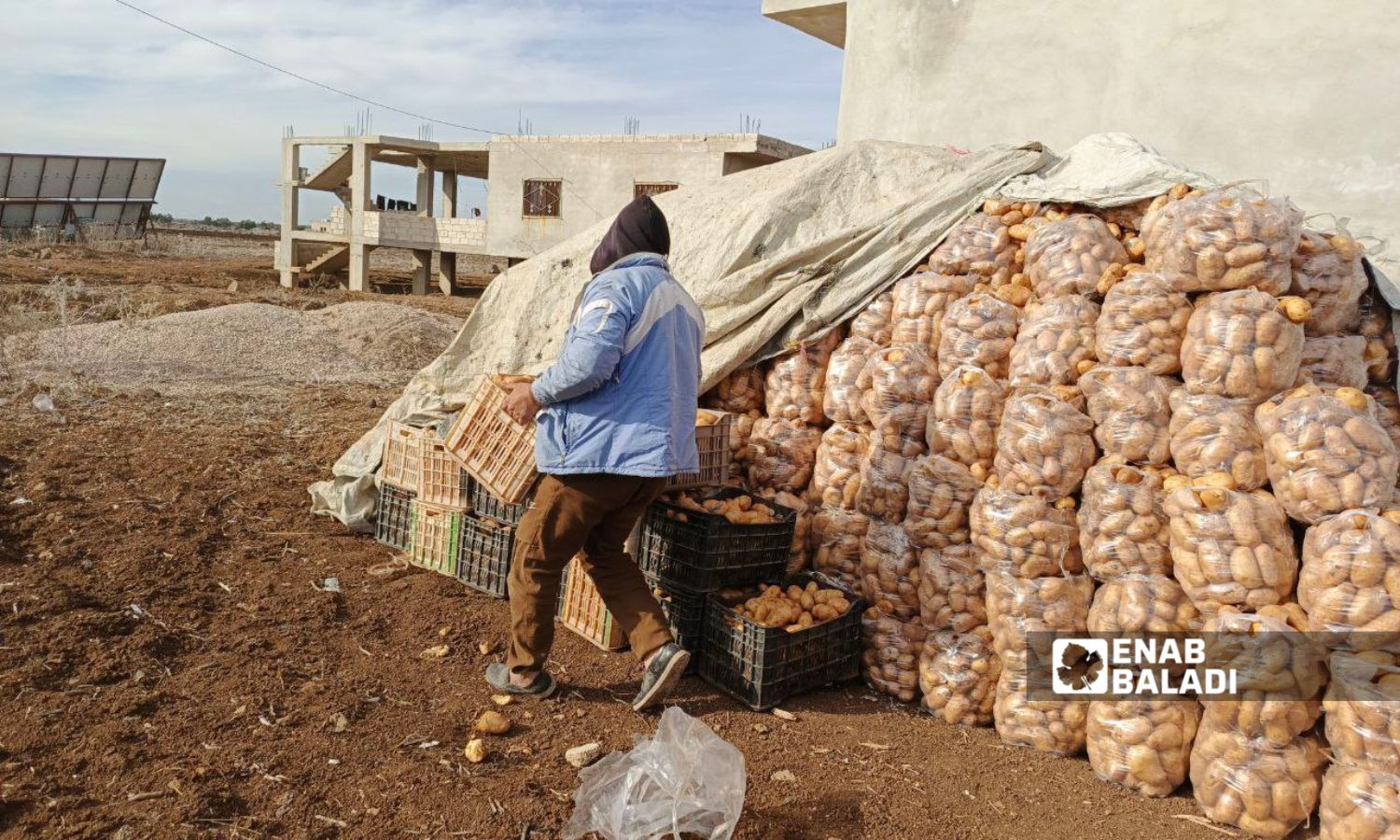



Daraa – Halim Muhammad
Farmers in Daraa governorate have reduced the areas designated for potato cultivation during the spring season compared to the previous fall season.
The reduction in acreage is attributed to several reasons, according to farmers in Daraa speaking to Enab Baladi, including the decline in potato prices in local markets, along with rising production costs, such as the high prices of imported seeds, the removal of subsidies for fertilizers and fuel, delayed rainfall, and the inability to control Syrian borders, which has led to the entry of smuggled seeds.
Hassan al-Eid, a farmer from the city of Inkhil in northern Daraa, limited his potato cultivation this season to 40 dunams compared to nearly 700 dunams last season.
Al-Eid told Enab Baladi that he fears financial losses due to the unclear outlook for protecting the agricultural sector from the current government.
He replaced potato cultivation with less costly crops such as fava beans and wheat, noting that potato crops require a larger capital investment, which includes land plowing and seed costs reaching 1,400 USD per ton (sufficient for planting only six dunams). Each dunam needs 100 kilos of soil, 50 kilos of fertilizer, and two meters of organic fertilizers.
Potato prices in the local market dropped after the fall of the Assad regime from 9,000 Syrian pounds (about one USD) per kilo to 2,000 Syrian pounds, while the cost of harvesting each kilo to bring it to the market is 1,500 pounds.
In hopes of improving potato prices during Ramadan, Ahmed al-Harir stored his fall harvest, estimated at 120 tons.
After suffering losses last season, al-Harir decided not to plant potatoes in the upcoming spring season, despite his usual practice every year, and instead planted his land in the town of Mleihat al-Atash in eastern Daraa with wheat and barley.
Meanwhile, Ibrahim al-Natour, a farmer from the city of Nawa, reduced the area he intended to cultivate with potatoes from 200 to 100 dunams, fearing continued price declines and potential financial losses, according to his statements to Enab Baladi.
Jamal al-Masalma, head of the Daraa Agricultural Chamber, stated to Enab Baladi that the reduction in potato planting areas is due to the drop in its price following the delayed issuance of the decision to allow its export last year, leading to a glut of the product that accompanied high yields in the previous fall season.
Al-Masalma added that the purchasing power of residents is weak, which has affected their consumption of the product, and that the Gulf markets did not import large quantities of potatoes. These factors have led to a decline in prices, contributing to farmers’ fear of financial losses should they plant their usual potato areas.
Farmers have been accustomed to purchasing seeds from the Seed Multiplication Institution at a subsidized price lower than the market price after registering and paying half its value upfront. However, this year, the price of seeds in the local market has become lower than the institutional price.
The price of a ton of seed in the local market reached 1,200 USD, while at the Seed Multiplication Institution it was at 1,400 USD.
Al-Masalma noted that quantities of seeds had entered through smuggling from Lebanon, “breaking” their price in the local market.
He warned against planting these varieties entering through smuggling, as they are likely to be infected during the tuber formation stage.
Hassan al-Eid mentioned that he refrained from accepting the seeds despite having paid half their price as a first installment during registration, preferring to lose the amount already paid rather than “risk” planting a crop he anticipates will incur losses.
Farmers complained to the director of the Seed Multiplication Institution in Daraa, but so far, there has been no response regarding refunding the amounts paid for potato seeds, according to al-Eid.
The head of the Daraa Agricultural Chamber stated that there is a stagnation in the seed supply witnessed by both the Seed Multiplication Institution and the private sector after some farmers relied on local seeds from the fall crop.
He added that the price of a ton of local seeds does not exceed 400 USD, and its yield is lower than that of imported seeds, with the former producing four tons per dunam and the latter yielding five tons.
The delay in rainfall has affected the potato planting season, as some farmers are waiting for rain to provide water before planting.
Farmer Majd al-Mubasbis has resorted to irrigating the land before planting, leading to additional costs that he could have avoided in previous years. He waited until the beginning of February, hoping for rainfall to cover the water supply costs, which included drawing water from a well and operating it using diesel.
if you think the article contain wrong information or you have additional details Send Correction